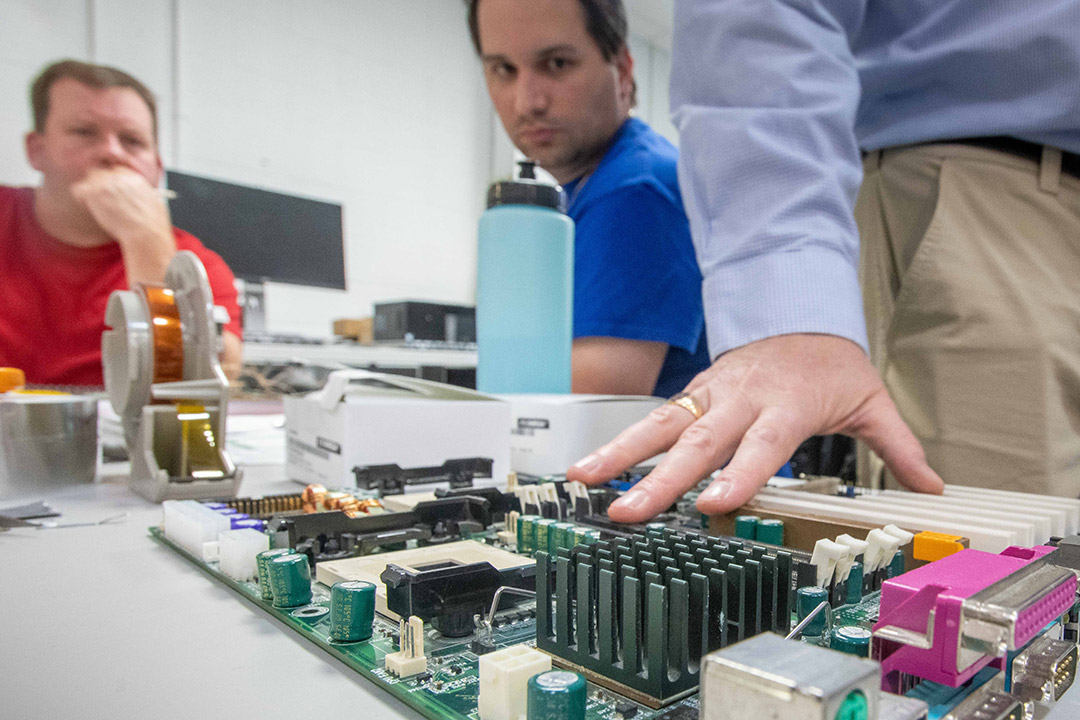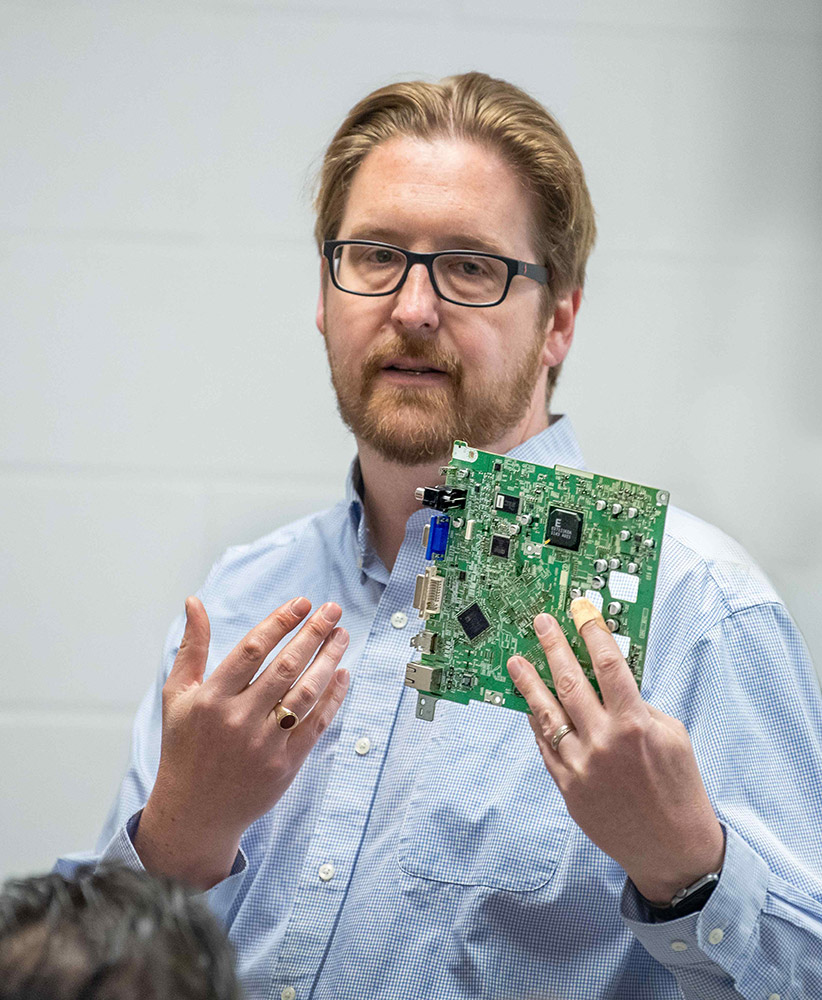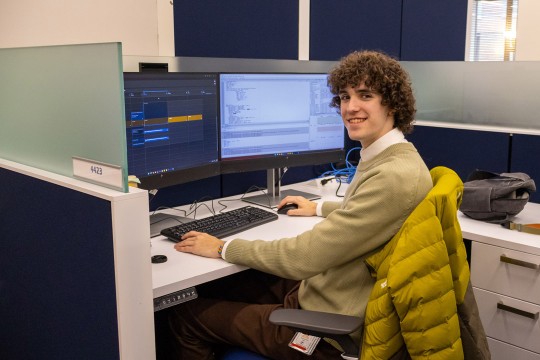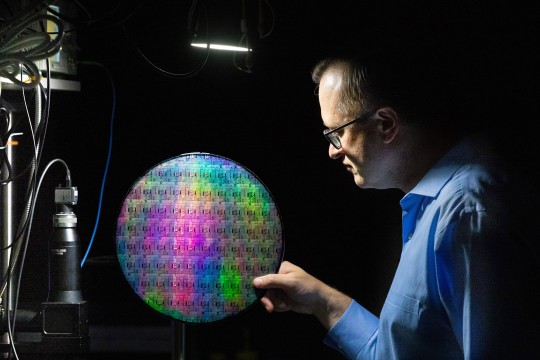RIT Certified offers professional training course for L3Harris technicians
Extensive course in electronics assembly improves skills to lead circuit board manufacturing process for military equipment
Carlos Ortiz
Trainees at a recent electronics assembly session learned about how different components are embedded on printed circuit boards, tested and eventually embedded into electronic devices.
Twelve technical specialists from L3Harris are part of a high-tech workforce development pilot program at Rochester Institute of Technology learning how to build the “brains” inside electronic devices.
This first cohort of students is part of the region’s broader economic development initiatives to expand industries such as advanced manufacturing. The series provides training to improve skills required in that high-demand industry, and it was recently launched through a partnership with the company and RIT Certified—the university’s professional training and workforce development division.
L3Harris specialists participated in the electronic assembly training series to better understand the procedures required to attach transistors, capacitors, integrated circuits, and wires onto printed circuit boards. Once completed, circuit boards can be embedded into the company’s high-tech military radios and other defense equipment.
“Students can walk away with new skills in the growing, high-demand area of surface-mount electronic manufacturing. They are learning the entire automated process and how to manage operations they will continue to see in the workplace,” said Martin Anselm, professor of manufacturing and mechanical engineering technology in RIT’s College of Engineering Technology.
Carlos Ortiz
Technicians from L3Harris train on electronic assembly equipment through a workforce development program being conducted by Martin Anselm, professor in RIT’s College of Engineering Technology.
As an expert in surface-mount technologies, Anslem also serves as director of the university’s Center for Electronic Manufacturing and Assembly (CEMA). He led the training in the CEMA Lab, which consisted of lectures about the technology, components, equipment, and materials. He provided demonstrations of the assembly processes, and students were able to do hands-on prototype testing. For example, circuit boards are fed through a reflow soldering oven to deposit and distribute solder—the metallic adhesive material used to fuse components to boards. Understanding heating requirements, throughput processes and tools needed to verify and monitor outcomes will be important as the students return to their workplace to take on more responsibilities at the company.
“We have similar equipment at L3Harris, and being able to better understand all the machines and components will be a way for us to improve our work. I am new to this whole system and need this training as we begin our work to produce more radios,” said Rochester resident Louis Barber. He was promoted into L3Harris’ Surface Mount Technology division a month ago; he’s been with the international company for one year. L3Harris produces communications systems primarily for the aerospace and defense industries.
Barber and his classmates will be able to advance the manufacturing process for the company and their careers through training connections to CEMA and RIT Certified. Established in 2022, RIT Certified provides a wide range of course offerings, and its curriculum and instructional developers work closely with RIT faculty to design relevant professional trainings, certificate options, and skill-based programs for regional and national organizations like L3Harris.
The connection to CEMA and its electronic assembly expertise is a natural collaboration between the company and the university. RIT is known for its broad range of computer chip development capabilities from design and development to the assembly packaging of electronic components. CEMA has various high-tech assembly equipment and is one of the university’s central training facilities for designing, producing, inspecting, and testing circuit boards. As a testing and training facility for companies, individuals can learn all aspects of the assembly process through hands-on work at each station, and organizations can bring prototypes to be tested extensively before scale-up and production.
Anselm is updating content and activities for several formats that will be offered by RIT Certified—from fully online to hybrid with some onsite lab requirements. Having student as well as company input ensures the content is relevant for a rapidly changing manufacturing industry.
“This surface-mount technology course is an example of how RIT Certified collaborates with expert faculty from RIT to offer niche training to employers, such as L3Harris, to serve a pressing need in their workforce,” said Dennis Di Lorenzo, executive director for RIT Certified. “Manufacturing technology in our region represents a substantial need for training at all levels, from line technicians to higher level engineers. You will see more of these courses and programs from RIT Certified in the coming months to meet this need.”
Some of that important programming will come about through “Promoting Choice: Alternative Pathways into Work and Economic Mobility,” and funding awarded to RIT Certified designed to deliver employer-driven, competency-based workforce training and wraparound support with community and industry partners that will reduce the barriers to participation and work for historically marginalized communities in the Greater Rochester region.













